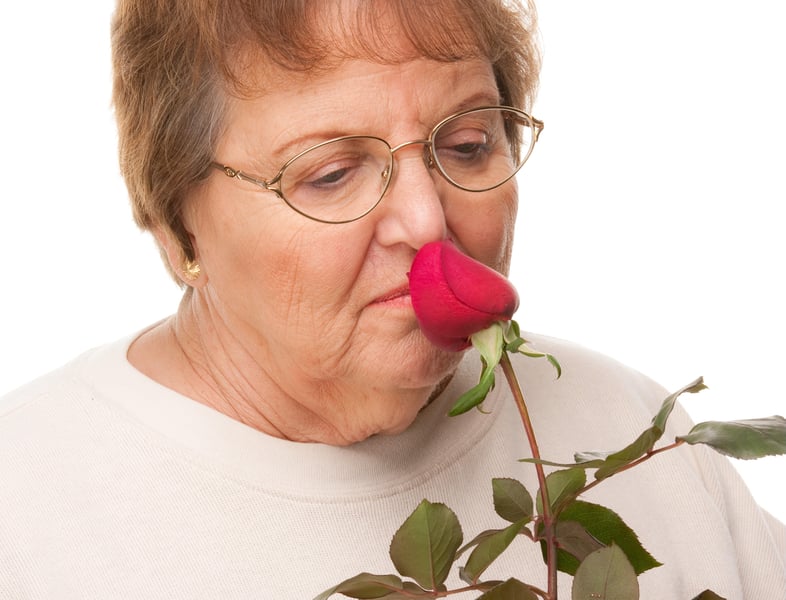Get Healthy!
Results for search "Anosmia (Poor Sense Of Taste Or Smell)".
Health News Results - 18
People who carry a gene that's associated with Alzheimer's disease may lose their sense of smell long before memory and thinking problems occur, a new study suggests.
This early sign of potential dementia is not seen in people who don't carry this gene, called APOE e4, researchers report July 26 in the journal Neurology.
"Testing a person's ability to detect odors may be a...
- HealthDay Reporter
- Steven Reinberg
- |
- July 26, 2023
- |
- Full Page
Dogs can sniff out and track someone based on their scent, a trait that has aided scores of criminal investigations.
Laboratory scientists working with human odors report that a new discovery may also further crime solving: They've determined that the scents of women and men differ, at least in their palms.
The researchers were able to predict someone's sex with nearly 97% accu...
- HealthDay Reporter
- Cara Murez
- |
- July 7, 2023
- |
- Full Page
Researchers have found significant new evidence of a link between a decreased sense of smell and the risk of developing depression later in life.
Known as hyposmia, or at its most profound, anosmia, the condition has been associated previously with Alzheimer's disease in older adults.
"We've seen repeatedly that a poor sense of smell can be an early warning sign of neurodegenerativ...
- HealthDay Reporter
- Cara Murez
- |
- July 3, 2023
- |
- Full Page
COVID caused more than 20 million Americans to lose their ability to smell and taste, and at least 25% haven't regained those vital senses, a new study says.
Survey responses from nearly 29,700 adults also show a correlation between more severe COVID infection and taste and smell loss, researchers reported recently in the journal
One of the signature symptoms of COVID-19 infection in the early months of the pandemic was a loss of the sense of smell.
Now, new research finds that is no longer the case, thanks to the new variants that have been circulating more recently.
The risk of losing sense of taste or smell is now only about 6% to 7% of what it was during the pandemic's early stages, according to researc...
- HealthDay Reporter
- Cara Murez
- |
- June 7, 2023
- |
- Full Page
Doctors already test seniors' hearing and vision. Sense of smell could be added to screenings one day, according to researchers who found links between its loss and risk of frailty in older adults.
"We use our sense of smell to identify the threat of a fire or to enjoy the fragrance of flowers on a spring day. But just like vision and hearing, this sense weakens as we age,"said study co-a...
- HealthDay Reporter
- Cara Murez
- |
- January 13, 2023
- |
- Full Page
One of the hallmarks of a COVID-19 infection has been a lost sense of smell after the infection ends.
In a new study, researchers blame an ongoing immune assault on the olfactory nerve cells -- cells found at the top of the nasal cavity -- and a decline in the number of those cells. The study was led by a team at Duke Health in Durham, N.C.
"One of the first symptoms that has typica...
- HealthDay Reporter
- Cara Murez
- |
- December 27, 2022
- |
- Full Page
One of the most disturbing symptoms of COVID-19 has been the sudden loss of taste and smell.
Worryingly, some people don't regain these senses after recovering from their infection, raising the question of whether they'd ever again be able to taste and smell.
Now there's good news on that front -- about 9 out of 10 patients will regain those senses within two years of their COVID in...
- HealthDay Reporter
- Dennis Thompson
- |
- August 10, 2022
- |
- Full Page
Could the future of dementia screening include a test of a person's sense of smell?
It may, suggests a new study that found the decline in a person's sense of smell could predict their loss of mental function and warn of structural changes in the brain that are important in Alzheimer's d...
- HealthDay Reporter
- Cara Murez
- |
- July 29, 2022
- |
- Full Page
Some 27 million people worldwide could suffer long-lasting damage to their sense of smell or taste following COVID-19 infection, and women are particularly vulnerable, a new study reports.
"Our findings are likely to be of substantial relevance to general doctors and otolaryngologists ...
- HealthDay Reporter
- Dennis Thompson
- |
- July 28, 2022
- |
- Full Page
Since the early days of the pandemic, loss of smell and taste have been tied to COVID-19 infection. But a new study shows those telltale traits are much less likely with the Omicron variant than the earlier Alpha and Delta versions of the coronavirus.
The findings are significant in deter...
- HealthDay Reporter
- Robert Preidt
- |
- May 11, 2022
- |
- Full Page
It has happened to millions during the pandemic: a sudden loss of smell that heralds the start of a COVID-19 infection. But scientists have been stumped as to why.
Until now.
New research suggests the symptom is due to inflammation rather than directly caused by the coronavirus.
The researchers noted that loss of smell (
Immune system-triggered inflammation is the likely reason for the loss of smell reported by many COVID-19 patients, a new study finds.
"As a neuropathologist, I wondered why smell loss is a very common symptom with COVID-19 but not with other respiratory diseases," said lead study author Dr. Cheng-Ying Ho. She ...
- HealthDay Reporter
- Robert Preidt
- |
- April 12, 2022
- |
- Full Page
Your sense of smell may not be as good as that of your ancestors.
A new study that tested volunteers' perceptions of various smells -- including underarm odor -- adds to growing evidence that people's sense of smell is declining, little by little.
"Genome-wide scans identified novel genetic variants assoc...
- HealthDay Reporter
- Robert Preidt
- |
- February 4, 2022
- |
- Full Page
Lyss Stern lost her sense of smell when she was diagnosed with COVID-19 in March 2020, and it still hasn't returned.
Stern, 47, a New York City author and mother, has seen countless doctors and taken many types of medicine, vitamins and supplements to get her sense of smell back. She also undergoes acupuncture regularly and saw an energy healer -- all to no or very little avail.
"Ye...
- HealthDay Reporter
- Denise Mann
- |
- November 18, 2021
- |
- Full Page
People who've lost their ability to smell and taste due to COVID-19 have significant struggles, but they can find ways to cope with their situation, a new study shows.
One of the most common side effects of COVID-19 is the loss of the sense of smell, which severely affects the sense of taste. This can lead to anxiety, depression and reduced quality of life.
In this study, five women...
- HealthDay Reporter
- Robert Preidt
- |
- October 27, 2021
- |
- Full Page
Most adults who lose smell or taste due to COVID-19 infection regain those senses within months, but a quick recovery is more likely in those under 40, a new study finds.
It included 798 participants in an ongoing survey who reported a loss of either sense after testing positive for COVID.
- HealthDay Reporter
- |
- October 11, 2021
- |
- Full Page
A lost or altered sense of taste, dry mouth and sores are common among COVID-19 patients and those symptoms may last long after others disappear, Brazilian researchers report.
Nearly 4 in 10 COVID patients experience impaired taste or total loss of taste, but dry mouth affects even more -- up to 43%, according to their broad review of more than 180 published studies.
It looked at or...
- HealthDay Reporter
- Alan Mozes
- |
- September 8, 2021
- |
- Full Page





















